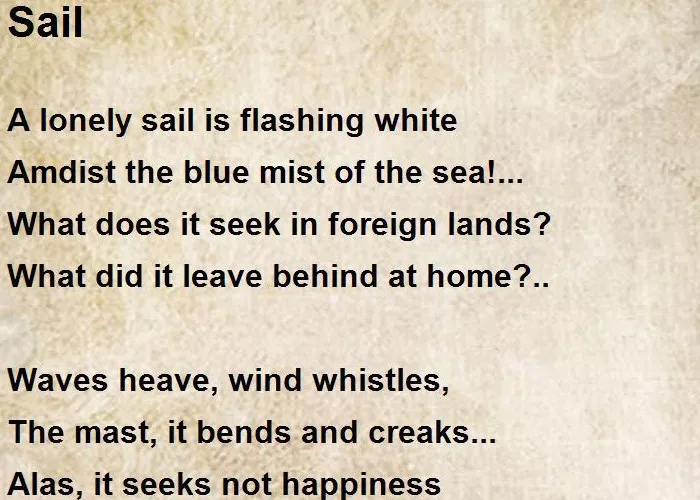Welcome to Poem of the Day – Sail by Mikhail Yuryevich Lermontov.
Mikhail Yuryevich Lermontov, one of Russia’s greatest Romantic poets, penned the iconic poem “Sail” (Парус) in 1832 at the age of just 18. This brief yet profound work encapsulates the themes of longing, existential search, and solitude, reflecting both the poet’s internal struggles and the broader Romantic ideals of his era.
Sail Poem
A lone white sail shows for an instant,
It looms through the blue of the mist,
What seeks it in lands so distant?
What has it in its native seas missed?
Whirlwind blows, bending mast, ever stronger,
Waves rise, clouds in darkness descend,
Alas! It is not a joyful wander,
It is rest from its rest that it begs.
Beneath, it’s a stream crystal-sparkling,
Above, it’s the sun golden-bright;
But it, seeking storms as if marvels,
In storms it would seek its delight.
Structure and Form
“Sail” is a three-stanza poem written in quatrains, employing a traditional rhyme scheme (ABAB) and a steady iambic tetrameter. This rhythm imbues the poem with a melodic quality, evoking the undulating motion of waves. Despite its simplicity, the structure mirrors the poet’s skill in conveying deep emotion through concise, balanced lines.
Themes
Longing and Existential Search
The sail serves as a central metaphor for the human soul—restless, yearning, and forever in pursuit of something indefinable. It seeks distant lands, yet, paradoxically, seems unable to find peace either in its native seas or beyond. This reflects the universal Romantic theme of dissatisfaction with the mundane and a longing for something transcendent.
The Allure of Struggle and Danger
The sail’s preference for storms over calm seas suggests a Romantic fascination with adversity. Lermontov, like other Romantic poets, often portrayed struggle as essential to the human experience. Here, the sail rejects tranquility, seeing beauty and meaning in the tumult of storms—a metaphor for the trials of life.
Solitude and Alienation
The solitary nature of the sail mirrors Lermontov’s own feelings of alienation. The poet, often at odds with society, found solace in the idea of solitary wanderings, much like the lone sail defying the vast sea.
Symbolism
The Sail: The sail represents the human spirit, striving and searching amidst an indifferent universe. Its loneliness underscores the existential isolation that was a hallmark of Lermontov’s work.
The Sea and Sky: These elements symbolize the infinite, the unknown, and the divine. The contrast between the “crystal-sparkling” sea and the “golden-bright” sun above suggests a dichotomy between earthly existence and higher aspirations.
The Storm: A metaphor for life’s challenges, the storm reflects both the chaos of existence and the sail’s—and by extension, humanity’s—resilience.
Romantic Context
“Sail” is quintessentially Romantic in its themes and style. It aligns with the era’s fascination with nature, the sublime, and the individual’s struggle against societal constraints. Lermontov’s work is often compared to that of Lord Byron, whose influence is evident in the poem’s tone and imagery. However, Lermontov adds a uniquely Russian depth, steeped in philosophical introspection and an acute awareness of the inevitability of struggle.
Personal Resonance
For Lermontov, the sail may have been a reflection of his own life. Born into an aristocratic family but plagued by personal tragedy and disillusionment, Lermontov often felt a deep disconnect from the world around him. His yearning for meaning and defiance of societal norms echo through the sail’s lonely voyage.
Conclusion
“Sail” is a masterpiece of brevity and depth, capturing the essence of Romanticism while offering timeless insights into the human condition. Through vivid imagery, elegant structure, and profound themes, Lermontov invites readers to reflect on their own journeys—both external and internal. The poem’s enduring appeal lies in its ability to resonate with anyone who has felt the pull of the distant horizon or the allure of life’s storms.In the end, like the sail, we are all voyagers, seeking delight not in calm but in the tumult that shapes our souls.

